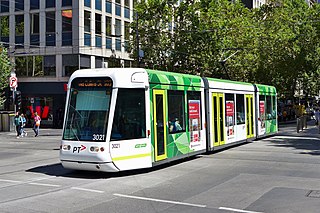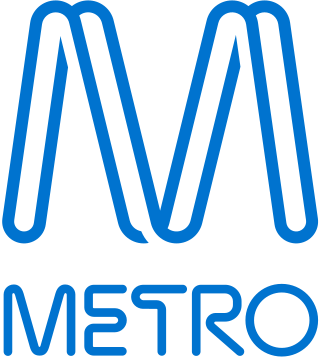
Alstom is a French multinational rolling stock manufacturer which operates worldwide in rail transport markets. It is active in the fields of passenger transportation, signaling, and locomotives, producing high-speed, suburban, regional and urban trains along with trams.
The X'Trapolis is a series of multiple units designed and built by Alstom. The trains have high floors, and are available in both single- and double-deck configurations. They are typically powered by an external electrical source, but may also be powered by batteries, hydrogen or diesel-electric power units.

The C-class Melbourne tram is a fleet of three-section Alstom Citadis 202 trams built in La Rochelle, France that operate on the Melbourne tram network. They were the first low-floor trams in Melbourne, being delivered in 2001-2002.

The Alstom Citadis is a family of low-floor trams and light rail vehicles built by Alstom. As of 2017, over 2,300 Citadis trams have been sold and 1,800 tramways are in revenue service throughout the world, with operations in all six inhabited continents. An evolution of Alstom's earlier TFS vehicle, most Citadis vehicles are made in Alstom's factories in La Rochelle, Reichshoffen and Valenciennes, France, and in Barcelona, Spain, and Annaba, Algeria.

The Frankston line is a commuter railway line in the city of Melbourne, Victoria, Australia. Operated by Metro Trains Melbourne, it is the city's third longest metropolitan railway line at 42.7 kilometres (26.5 mi). The line runs from Flinders Street station in central Melbourne to Frankston station in the south-east, serving 28 stations via South Yarra, Caulfield, Moorabbin, and Mordialloc. The line continues to Stony Point on the non-electrified Stony Point line. The line operates for approximately 20 hours a day with 24 hour service available on Friday and Saturday nights. During peak hour, headways of up to 5 to 10 minutes are operated with services every 10–20 minutes during off-peak hours. Trains on the Frankston line run with a two three-car formations of Comeng, Siemens Nexas, and X'Trapolis 100 trainsets.

The Williamstown Line is a commuter railway line in the city of Melbourne, Victoria, Australia. Operated by Metro Trains Melbourne, it is the city's third shortest metropolitan railway line at 16.2 kilometres (10.1 mi). The line runs from Flinders Street station in central Melbourne to Williamstown station in the south, serving 12 stations via Footscray, Yarraville, and Newport. The line operates for approximately 19 hours a day with 24-hour service available on Friday and Saturday nights. During peak hours, the transportation system operates with headways of up to 20 minutes, ensuring frequent service for commuters. During off-peak hours, the service intervals are adjusted to provide transportation every 20-30 minutes, accommodating the lower demand. Trains on the Williamstown Line run with two three-car formations of Comeng, Siemens Nexas, and X'Trapolis 100 trainsets.

The Flemington Racecourse line is a commuter railway line in the city of Melbourne, Victoria, Australia. Operated by Metro Trains Melbourne, it is the city's shortest metropolitan railway line at 7.8 kilometres (4.8 mi). The line runs from Flinders Street station in central Melbourne to Flemington Racecourse station in the north west, serving 5 stations via North Melbourne. The line operates only during special events, with services as frequent as every 4 minutes during peak periods of those special events. Trains on the Flemington Racecourse line run with a two three-car formations of Comeng, Siemens Nexas, or X'Trapolis 100 trainsets.

Connex Melbourne was a train operator in Melbourne, Australia. Formed in July 1998 as Hillside Trains, a business unit of the Public Transport Corporation, it was privatised in August 1999 becoming a subsidiary of Connex.

The Comeng train is a type of electric multiple unit (EMU) that operates on the suburban railway network of Melbourne, Victoria, Australia. Built by Commonwealth Engineering (Comeng) in Dandenong, they were introduced in 1981 as a replacement for the Tait and Harris trains. In total, 570 carriages were built.
The X'Trapolis 100 is a class of single deck electric multiple units part of Alstom's X'Trapolis family of trains, operated in Melbourne, Victoria, Australia and Valparaíso, Chile.

The Scharfenberg coupler is a commonly used type of fully automatic railway coupling.

Ballarat North Workshops is a railway systems engineering facility located in the provincial city of Ballarat, Victoria, Australia. They are located in the suburb of Soldiers Hill on Creswick Road, and occupy 5.5 hectares of land beside the junction of the Mildura and Serviceton railway lines.
This article contains a list of jargon used to varying degrees by railway enthusiasts, trainspotters, and railway employees in Australia, including nicknames for various locomotives and multiple units. Although not exhaustive, many of the entries in this list appear from time to time in specialist, rail-related publications. There may be significant regional variation in usage; state variances may be indicated by the state abbreviation.

Metro Trains Melbourne, often known simply as Metro, is the operator of services on the electrified suburban passenger rail network in Melbourne, Victoria, Australia. It is the largest suburban rail network in Australia with 17 lines, 219 stations and 405 km (252 mi) of railways and second busiest network in Australia. It is owned by Public Transport Victoria who sublet the infrastructure and rolling stock of Metro Trains Melbourne to a joint venture between Hong Kong-based MTR Corporation (60%), John Holland Group (20%) and UGL Rail (20%). The three constituent companies are also partners in the Metro Trains Sydney joint venture, which has operated the Sydney Metro network since 2019.

The High Capacity Metro Train (HCMT), or CCD5006 in its manufacturer CRRC Changchun, is a type of electric multiple unit (EMU) train for use by Metro Trains Melbourne on the Melbourne rail network. The first train set entered service on 27 December 2020 and will become the primary rolling stock used in the Metro Tunnel when it opens in 2025. The HCMTs carry around 1,400 passengers in seven carriages, running on Melbourne's 1,500 V DC overhead catenary system, and are currently the most advanced trains in the Metro Trains fleet. A consortium of investors and rail companies are constructing the trains in China and Australia via a contract with the Victorian Government, in addition to upgrade works necessary for the operation of the trains.
The X'Trapolis Mega is an electric multiple unit, part of the X'Trapolis family, built by Gibela for the Passenger Rail Agency of South Africa (PRASA) that operates in Metrorail commuter service.

The Sydney Metro Metropolis Stock is a class of electric multiple units that operate on the Sydney Metro network. Built by Alstom as part of their Metropolis family, the trains are the first fully automated passenger rolling stock in Australia as well as the first single-deck sets to operate in Sydney since their withdrawal from the suburban rail network in the 1990s. A total of 176 carriages, making up 22 6-car sets, entered service in 2019 with the opening of the Metro North West Line. 23 more sets are gradually being rolled out for the City & Southwest extension, to commence service in 2024, expanding the Metropolis fleet to 45 sets.

The X'Trapolis 2.0 is a series of electric multiple unit (EMU) trains to be used for Metro Trains Melbourne, part of Alstom's X'Trapolis family. The trains are set to enter service between 2024 and 2026.
The G-class Melbourne tram is a three-section articulated tram, to be introduced onto the Melbourne tram network in 2025. The trams will be low-floor, replacing the Z-class and A-class trams, which will help improve passenger accessibility across the network. Construction is scheduled to begin in late 2023. The design is based on the Flexity 2.
The Dandenong rolling stock factory in South Dandenong, Melbourne, Australia was opened in 1954 by Commonwealth Engineering, it has since been operated by ABB, Adtranz and Bombardier and Alstom.














